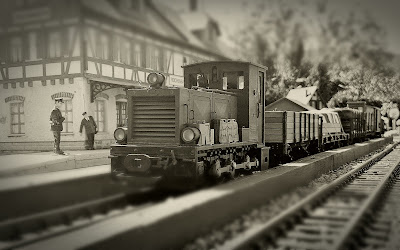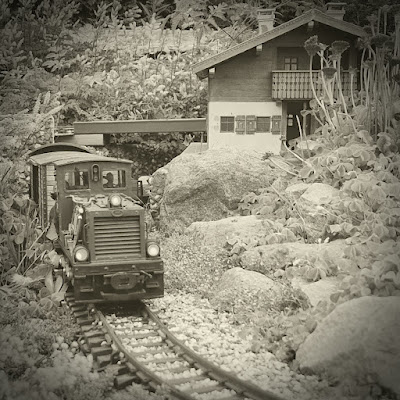When doing some research on a wagon I plan to modify for my G-scale Heeresfeldbahn later this year, it came to my knowledge that the German Heeresfeldbahns did not only operate trains close to the front, but that they probably also operated trains on the more domestic Pommerschen Landesbahnen in the province of Pomerania. The wagon I was doing some 'studies' on was also used on the Pomeranian State Railway (PKB), and eventually there will be a future blogpost update on the model.
So Wehrmacht was operating military trains on German regular narrow gauge railways between towns and villages in the province of Pomerania until the end of the war. Actually I've seen disbanded and disused tracks from this railways during visits to northern Poland. The German service on these narrow gauge railways seized when the area was occupied by Soviet forces in February/March 1945 after the East Pomeranian offensive.
What did the situation look like in East Pomerania in the the period before the offensive was launched?
I have no idea, but I expect that the military railway traffic was increased on the
civilian narrow gauge lines to start the preparation to meet the advancing Soviet forces from the east. The defensive line
Pomeranian Wall/ Pommer Wall/ Pommernlinie was renovated in the summer of 1944. They didn't manage to draft enough personell to fully man it, so it could be an efficient barrier against the upcoming offensive though.
Pomerania was generally considered to be a 'safe area' in Germany for a long time, but after 1943 it was targeted by allied bombing raids.
The railway lines were still operating regular services for both passenger and goods transports...
...but the military traffic got priority.
The military presence must have been evident.
At the same time, troop-trains was coming from East and the other side of river Oder. With hospital-wagons...
No mass evacuation was ordered by the Gauleiter from the province of Pomerania (before it was too late), but some residents chose to 'visit' family in other parts of Germany when the hospital-trains from the east startet to show up and revealed what to expect from the coming offensive. Therefore regular passenger service would run as long as possible.
Räder müssen rollen für den Sieg, but it was too late to change the tide of war. The Soviet offensive would eventually hit Ostpommern and open the way to Berlin for the Red Army.
This was a slightly different 'day out'-report than I use to write them. The weather was nice and my friend and fellow MRC-member Gylmer invited to a running session on his very German-looking and scenic garden railway. -Actually this was the 4th garden-meeting in just 11 days hosted by members of our MRC, so our club is a very active one. With so many running sessions over a such a short time I thought there was an occasion to do a little different report this time.
Thank you very much for your invitation and hospitality, Gylmer. Luckily one of those military supplies did not fall in Russian hands, as it were ment for you:
The weather forecast does not look so good for the coming days or week, so there should be time to catch upon some indoor activities and wargaming again soon. Please follow this blog for coming updates.

























No comments:
Post a Comment